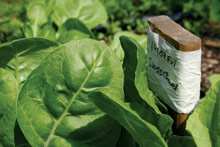On a cool but sunny day in late March, I parted a plastic curtain, stepped into a hoop house in Swannanoa, and found a flourishing garden. Arugula, Swiss chard, spring beauty, ‘Lollo Rosso’ lettuce, mizuna, bunching onions, carrots and more grew in long, wide rows of rich, dark earth piled almost a foot higher than the pathways between them. The vegetables were planted back in December in a hoop house warmed only by the sun.

As I surveyed the bounty, Joan Engelhardt urged: “Go ahead: Graze. Try some!” Crouching beside a thick patch of cilantro, she broke off a few leaves and nibbled. “It’s so sweet,” she said.
I love cilantro for its bright bite, but she was right. This batch had a sweet hint, with leaves much more tender than the store-bought kind. And at a time when most gardeners are still sorting through seed catalogs, this stuff was thriving and ready for harvest.
It’s all the work of Winter Green, a new nonprofit co-founded by Engelhardt and Pat Hinkley—two older women not quite ready for retirement.
The mission, says Hinkley, is simple: “We need to grow local, and we can do it in winter.” The two met while exploring that idea with another local group but were impatient to get past the talking stage and start showing how it can be done using hoop houses—simple, arched structures covered with clear plastic that are greenhouses’ low-budget cousins. Hinkley and Engelhardt propose installing them in urban locations around town, such as schools or neighborhoods. Winter Green can set them up, maintain them and do the gardening—or just help other groups and individuals get started, notes Hinkley.
The inspiration was born of a blend of experience and research, she explains, citing authors Eliot Coleman (who’s written about four-season farming in Maine) and sustainability advocate Michael Pollan. Typically, the food we eat travels an average of 1,750 miles from farm to market, says Hinkley.
“That’s not sustainable,” Engelhardt chimes in.
Growing locally keeps the money and jobs in the community while producing fresh, high-quality food, Hinkley explains. And setting up hoop-house gardens shows that it can be done even in the dead of winter. “We’re about changing consciousness,” she declares. “This [project] is about educating people about where your food comes from.”
As with community gardens, both the benefits and work could be shared, she suggests. The previous week, the two women harvested about 17 pounds of food from the Swannanoa hoop house. They took some of it to local restaurants, where staff were thrilled to get fresh, local greens, reports Hinkley, boasting, “We have the best arugula.”
The project, she emphasizes, is collaborative, partnering with groups such as the Asheville Green Opportunity Corps (to create apprenticeship programs for young adults) and Asheville GreenWorks (formerly Quality Forward). The other key assist was getting access to an unused hoop house at the Buncombe Community School East in Swannanoa.
“It had holes in the roof, and we had to install a [system] to allow us to roll up the sidewalls,” says Engelhardt, but on the plus side, the structure is big enough to drive a tractor into. And while there have been the usual gardening challenges—leaf-munching green cabbage moths, groundhogs—overall, the project is off to a strong start.
“People are ready,” Hinkley asserts. The past few years have seen increased interest in growing food locally, and the current economic situation has actually been a boon, inspiring people to do more than just think or talk about growing and getting home-grown veggies. Even first lady Michelle Obama, notes Hinkley, recently announced plans for a vegetable garden at the White House.
There’s something uplifting about gardening, she observes. It can be cold outside, but step into a hoop house and “It’s a different world. It’s warm in here—or at least much warmer than outside—and there’s something alive in here.”
To learn more about Winter Green, go to www.winter-green.org, or call 242-2578.
Send your garden news and ideas to Margaret Williams at mvwilliams@mountainx.com, or leave a message at 251-1333, ext. 152.



Before you comment
The comments section is here to provide a platform for civil dialogue on the issues we face together as a local community. Xpress is committed to offering this platform for all voices, but when the tone of the discussion gets nasty or strays off topic, we believe many people choose not to participate. Xpress editors are determined to moderate comments to ensure a constructive interchange is maintained. All comments judged not to be in keeping with the spirit of civil discourse will be removed and repeat violators will be banned. See here for our terms of service. Thank you for being part of this effort to promote respectful discussion.